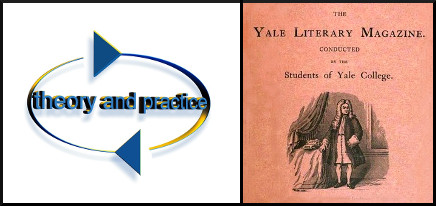Yogi Berra? Albert Einstein? Richard Feynman? Benjamin Brewster? Charles F. Kettering? Walter J. Savitch? Jan L. A. van de Snepscheut? Dave Jeske? Chuck Reid?
 Dear Quote Investigator: The following popular adage balances unsteadily between brilliance and absurdity:
Dear Quote Investigator: The following popular adage balances unsteadily between brilliance and absurdity:
In theory, theory and practice are the same. In practice, they are not.
This notion has been attributed to many people including famous baseball player Yogi Berra, scientific genius Albert Einstein, and prominent physicist Richard P. Feynman. What do you think?
Quote Investigator: There is no substantive reason to credit Berra, Einstein, or Feynman. The expression was coined before Einstein had reached his third birthday and before the other two were born.
The earliest strong match located by QI appeared in “The Yale Literary Magazine” of February 1882 which was written and edited by students. Benjamin Brewster who was a member of the class of 1882 wrote about an argument he had engaged in with a philosophical friend about theory versus practice. His companion accused him of committing a vulgar error. Emphasis added to excerpts by QI:[1]1882 February, The Yale Literary Magazine, Conducted by the Students of Yale College, Volume 47, Number 5, Portfolio: Theory and Practice by Benjamin Brewster, Quote Page 202, New Haven, Connecticut. … Continue reading
I heard no more, for I was lost in self-reproach that I had been the victim of “vulgar error.” But afterwards, a kind of haunting doubt came over me. What does his lucid explanation amount to but this, that in theory there is no difference between theory and practice, while in practice there is?
Brewster was humorously summarizing the position of his friendly opponent, and QI believes that the saying should be credited to Brewster.
Below are additional selected citations in chronological order.